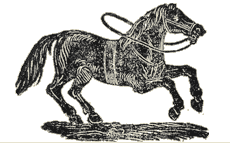- Startseite
- Primäre Suche
- Erweiterte Suche
- Kalendersuche
- Über die Ressource
- Hilfe
- Spenden
- Nutzungsbedingungen
Sprachauswahl




Veranstaltungstitel:
Third Concert given by the Prague Concert Orchestra [Prager Koncerorchesters]
Aufführungsort: Platýz
Programmsorte: Art music culture
Datum: 26/06/1851
Spielzeit: Summer
Programme including:
- Prague Concert Orchestra [Prager Koncert Orchesters]: participating orchestra
Kommentar:
Brief news of this concert was published by Bohemia 26/6/1851. A report noted that ‘Today’s concert of the “Prager Koncertorchesters” includes in great ensemble pieces in addition to Mendelssohn’s much requested “Hebrideanouverture”, also Beethoven’s “Leonore” and “King Lear” by Berlioz’. No further details of the event were given by the source, and the concert was not listed in the Tagesanzeiger texts of the newspaper.
A review, signed ‘V.’, of this event was published by Bohemia 3/7/1851. This began by remarking that the repetition of Mendelssohn’s ‘Hebriden-Ouverture’ was, with respect to its performance, ‘as brilliant as in the first concert [given by the orchestra], and gained the same thunderous applause from the very full Platteysaale [Platýz].’ The three other orchestral compositions [in the programme] included two works by Beethoven and one by Berlioz, a choice that sets the highest demands upon such an instrumental ensemble. With regard to precision, perfect ensemble and energy, the performance of the great “Leonore-Ouverture” was not on the level that we have come to expect from the previous productions of this orchestra.’ This was attributed to the lack of rehearsals and to other unspecified difficulties. Highly praised was, however, the ‘spirited and poetic’performance of the Allegretto from the A major Symphony, although ‘it is only to be regretted, that not the whole of this gigantic piece was given, as even for the connoisseur of such enormous works it is not easy to capture for oneself the particular mood by listening only to such a fragment.’
Of particular interest in the Bohemia review was the positive and enlightened response of the correspondent to Berlioz’s Overture King Lear. The composer was said to have endeavoured through ‘ingenious means and happy success to convey the highly dramatic colour [of the play].’ The great fantasy and imagination of the work was thought to present a challenge to the listener; aspects of the ‘form, melody, harmony and orchestration, when heard for the first time, are so overpowering and foreign to most people that they need to have some sympathy and rapport for the composer and his style of writing in order to appreciate their greatness, beauty and - to be fair - also their outlandish character. The great tone paining of the passions, the unsurpassed characterisation of the main protagonists and the masterful tone of the whole tragic picture (which portrays the local colour so well that even without the title ... one would be able to guess [the type of subject matter]), all have to be credited to Berlioz, even by the greatest opponent of his path. In any case, all objections in theory [to this work] are usually confounded by a lively performance of the piece. It would be difficult to criticize anything in the performance of this composition today; it was very successful with regard to the technical as well as the artistic content, and formed a worthy conclusion to the third and final concert of the society [orchestra].’
Of the solo items performed in the concert, the Bohemia review reported how in addition to a work for basson given by the member of the orchestra Mr Hartmann, and which received applause, ‘we also heard an ingeniously difficult, more peculiar than beautiful Fantasie [Phantasie] on Italian themes by Kauders played by the Petersburg violoncellist Schubert, and some brilliant Variations by the clarinettist Sobeck, of his own composition.’. The applause of the audience was noted as being as substantial as in previous concerts. The event was directed by Minkus.
The description by the review of the ‘great’ Leonore Overture suggests the work was the third of the three overtures. The event record programme is listed in the order in which the works were described by the review, with the concert noted as being opened by Mendelssohn’s Overture and concluding with Berlioz’s.
Zusammenfassung der Quellen:
Bohemia (26/06/1851)Bohemia (03/07/1851)